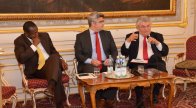The Permanent Mission of Hungary organized a panel discussion about the nexus between water and energy on June 18th 2013. The seminar focused on linkages between energy and water.
The speakers included Kandeh Yumkella, Director General of UNIDO, Professor András Szöllösi-Nagy, rector of the UNESCO Institute of Water and Mr. Gábor Baranyai, deputy state secretary at the Ministry of Foreign Affairs.
The Permanent Mission of Hungary organized a panel discussion about the nexus between water and energy on June 18th 2013. The seminar focused on linkages between energy and water.
The speakers included Kandeh Yumkella, Director General of UNIDO, Professor András Szöllösi-Nagy, rector of the UNESCO Institute of Water and Mr. Gábor Baranyai, deputy state secretary at the Ministry of Foreign Affairs. The presentations can be downloaded from this website.
Targets in the agenda of the sustainable development goals needs to developed in an interlinked way. One of the outcomes of the Vienna Energy Forum held in May 2013 was to set parallel targets for water and energy. Another relevant and developing idea is the smart cities concept as a holistic solution to address interconnected issues concerning water and energy. Urbanization is changing the world at an unparalleled rate, inter-sectoral dialogue is important for security within the water-energy nexus and also finding indicators to improve understanding of the water energy nexus for slums. Examples also include new waste to-energy projects, with the co-benefits of less water contamination. The International Institute for Applied Systems Analysis (IIASA), is working on comprehensive Global Energy Assessment models in exploring how to achieve global energy goals, focusing on an integrated approach to the water-energy nexus that would lower overall costs of their achievement.
There are increasing calls globally to include water in the energy debate as nations around the world develop new energy policies and evaluate the options they want to follow in response to the UN Secretary-General’s Initiative on Sustainable Energy for All (SE4All).
The inclusion of water in the energy debate is relevant as energy decisions have a broad range of impacts on water and food production. For example, novel water and energy policies in agriculture could enhance food production and security. However, abstracting water for irrigation may affect reservoir levels and reduce hydropower capacity, with negative consequences for energy security.
The water-energy-food nexus presents opportunities for policy-makers, business leaders, investors, nongovernmental organizations and the public at large to manage dwindling resources that are important for addressing important global development challenges.
Questions:
- How can we provide access to clean energy and clean water for everyone, and make sure that the energy we produce does not contribute to climate change?
- Is it true that floods occur in increasing frequency? If yes, why does that happen and what can we do?
- The recent extremely high level floods on the Danube and Elbe basins were rather scary. Why did that happen and how often we could expect the same happen?
- What should be the main components of the water/sanitation related SDGs? How to convince governments that water is going to be a major, if not THE major issue of the 21st century?
- Talking about the water/energy nexus, what is the current status of hydropower development globally?
- The water/energy nexus doubtlessly is very important but how about FOOD, the third component of the nexus? What are the interlinkages there?

